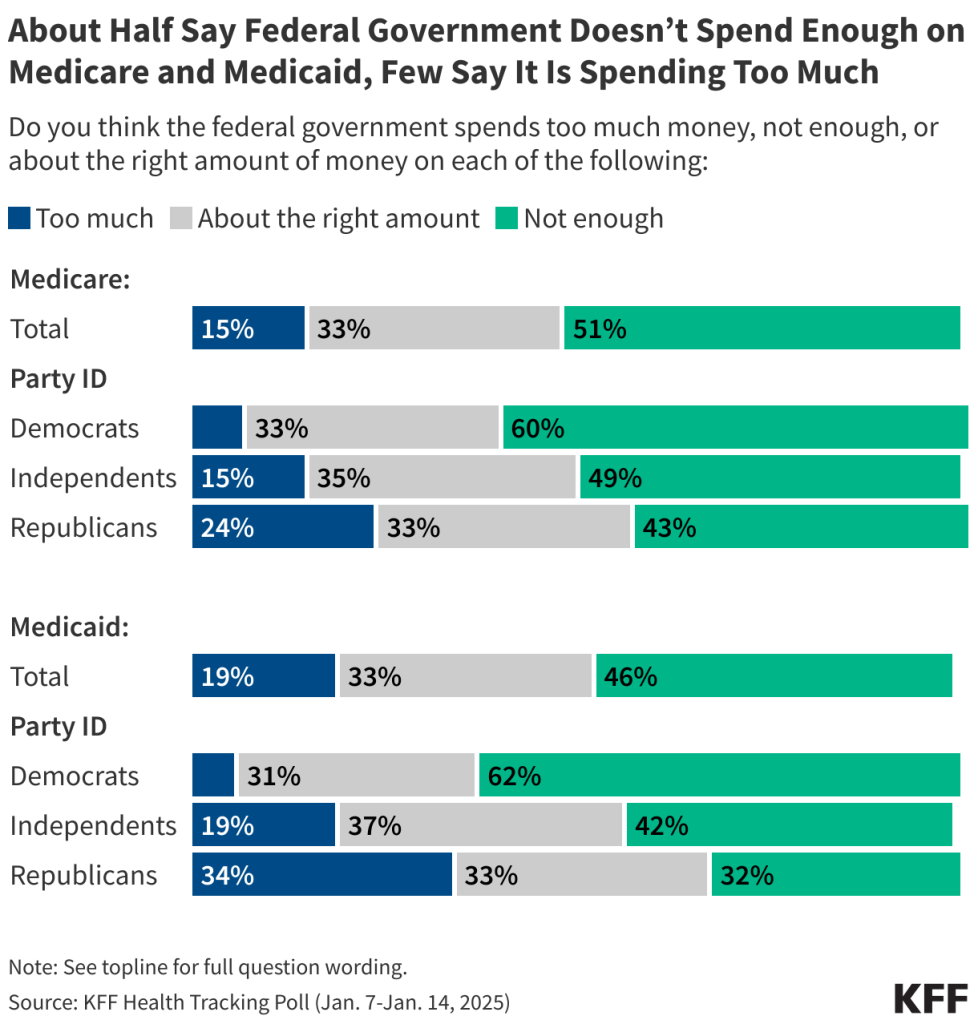
The independent source for health policy research, polling, and news.
As Congress Looks to Reduce Federal Spending, Medicare and Medicaid Remain Broadly Popular, and At Least Twice as Many People Want to Increase Spending Rather Than Cut It
Among Potential Actions on Health, the Public Sees Price Transparency and Limiting Chemicals in Food as Top Priorities, But Not Medicaid Cuts or Restricting Abortion
With the incoming Trump administration and Republican-led Congress looking to ways to reduce federal spending, a new KFF Health Tracking Poll finds that the Medicare and Medicaid programs remain broadly popular, and more people favor more spending on those programs than less spending.
About eight in 10 Americans overall view Medicare (82%) and Medicaid (77%) favorably. This includes majorities across partisans, including most Republicans (75% view Medicare favorably and 63% view Medicaid favorably).
About half (46%) of the public say the federal government doesn’t spend enough on Medicaid, more than twice the share (19%) who say the government spends “too much.” The gap is even larger for Medicare, with half (51%) of the public saying the government doesn’t spend enough compared to 15% who say the government spends too much.

The Affordable Care Act (ACA), sometimes called Obamacare, also remains popular, with nearly two thirds (64%) of the public holding favorable views, though with more of a partisan divide. Most Democrats and independents hold favorable views of the ACA, while about three quarters of Republicans (72%) hold unfavorable views.
Large majorities also say they are “very” or “somewhat” worried that people covered by each of the three programs in the future won’t get the same benefits available today. This includes 81% who say so about Medicare, 72% who say so about Medicaid, and 70% who say so about the ACA marketplaces. Republicans are less worried than other partisans about Medicaid and the ACA.
Ahead of President Trump’s inauguration, the poll also assesses how the public prioritizes 11 potential actions on health that the new administration and Congress could take.
About six in 10 say that boosting price transparency rules (61%) and limiting chemicals in the food supply (58%) are both a “top priority.” This includes majorities of Republicans, independents and Democrats.
During his first administration, President Trump issued federal regulations establishing price transparency requirements for hospitals and insurers, and Robert F. Kennedy Jr., his pick to head the U.S. Department of Health and Human Services, has long advocated against chemicals in food.
In contrast, few among the public rank several other health policies associated with President Trump and his allies as top priorities.
For example, about one in seven say that reducing federal spending on Medicaid (13%) or limiting access to abortion (14%) is a top priority, while much larger shares say each of these “should not be done” (44% and 51%, respectively). Other low-ranking priorities include cutting funding to schools that require students to get vaccinated (15%), encouraging communities not to add fluoride to their water supply (23%), and repealing and replacing the ACA (27%).
Among other health priorities:
- Medicare drug price negotiations. More than half (55%) of the public say it is a top priority to expand the number of prescription drugs subject to Medicare drug price negotiations, including most Democrats (65%) and about half of Republicans (48%). Only 3% say this shouldn’t be done.
- Regulating insurance claim denials. Most people (55%) say more closely regulating insurers’ decisions to approve or deny claims for health services or prescription drugs should be a top priority. This includes most Democrats (61%) and independents (59%), along with nearly half (45%) of Republicans. Overall, just 5% oppose this.
- Enhanced ACA subsidies. About a third (32%) say that extending the expanded financial assistance that helps make ACA marketplace health insurance affordable should be a top priority. This includes half of Democrats (50%) but few Republicans (16%). Only 7% say this shouldn’t be done.
The incoming Trump administration has established a new “Department of Government Efficiency,” or DOGE, charged with developing plans to cut federal spending and reduce regulations.
Most Americans (73%) say that reducing fraud and waste in government health programs would lead to “major” or “minor” reductions in federal spending overall. This includes most Republicans (80%), independents (72%), and Democrats (68%).
At the same time, more than half (55%) of the public also say that reducing fraud and waste would lead to reductions in the benefits that people receive from government health programs. At least half of Republicans (60%), Democrats (55%), and independents (51%) hold this view.
Other findings include:
- Most of the public say the government is not spending enough on the prevention of chronic diseases (60%) or prevention of infectious diseases and preparing for future pandemics (54%). Much smaller shares say the government spends “too much” on each of these.
- More than half (57%) of the public say they expect health care to become less affordable for their families over the next few years. This includes most (54%) Trump voters and half (51%) of Republicans despite the campaign’s emphasis on addressing rising costs, including in health care.
Designed and analyzed by public opinion researchers at KFF. The survey was conducted Jan. 7-14, 2025, online and by telephone among a nationally representative sample of 1,310 U.S. adults in English and in Spanish. The margin of sampling error is plus or minus 3 percentage points for the full sample. For results based on other subgroups, the margin of sampling error may be higher.